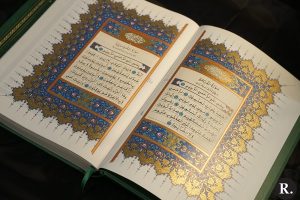
The Review of Religions is delighted to present the complete English translation of the commentary of Sūrah al-Ikhlāṣ – Chapter 112 of the Holy Qur’an – by Hazrat Mirza Bashiruddin Mahmud Ahmad (ra), translated into English for the first time.
Sūrah al-Ikhlāṣ, one of the shortest chapters in the Qur’an, discusses the unity of God, and so contains the essence of the entire Islamic teaching. Just as Sūrah al-Fātiḥah is considered to be an outline of the entire Qur’an, Sūrah al-Ikhlāṣ, together with the two succeeding chapters, Sūrah al-Falaq and Sūrah al-Nās, also contains the themes mentioned in Sūrah al-Fātiḥah. Indeed, in one tradition, the Holy Prophet (sa) stated that Sūrah al-Ikhlāṣ is equal to one-third of the Holy Qur’an.
This is one of the most insightful and in-depth commentaries of the Holy Qur’an ever written, and The Review of Religions has the honour of publishing it for our English readers for the first time.
By Hazrat Mirza Bashiruddin Mahmud Ahmad (ra),
Second Worldwide Head of the Ahmadiyya Muslim Community
Translated by Murtaza Ahmad
Edited by The Review of Religions Translation Team
ٱللَّهُ ٱلصَّمَدُ
Allah is the Being upon Whom everyone is dependent (but Who is not reliant on anyone)
Key Word Analysis [of al Ṣamad]
الصَّمَدُ: السَّيِّدُ الَّذِيْ لَا يُقْضَى دُوْنَهُ أَمْرٌ؛
That Chief without the help of Whom no work can be achieved or accomplished.
الدَّائِمُ – The Everlasting Being; الرَّفِيْعُ – The Incredibly Lofty Being; [1]
الصَّمَدُ: السَّيِّدُ الَّذِيْ يُصْمَدُ إِلَيْهِ – That Chief towards whom one is inclined at a time of need.’ [2]
Commentary
ٱللَّهُ ٱلصَّمَدُ [Allah al-Ṣamad] – Ṣamad refers to that Being Who does not depend on anything or anyone else, but all things are dependent upon Him. Qul huwa Allāh Aḥad affirmed that Allah exists and He is One; the proof of this claim has been given in the verse Allah al-Ṣamad. Some commentators say that these words have only been added here to match the poetic meter [rhyming scheme]. However, this view is incorrect. Rather, each verse in this chapter is a powerful proof for the subject matter in the preceding verse. Therefore, firstly: Huw Allāh Aḥad proclaims that ‘the reality is that Allah is singular and unique.’ This is followed with: ‘the evidence for this is Allah al-Ṣamad,’ that everything in the world depends on Him.
And when all things rely on Him and He alone fulfils all of our needs, what need remains for any other [divine] being? And if, despite this, someone is accepted as a divine being, we would have to admit that this deity would be useless, and clearly an ineffective being cannot be God. When even polluted water, polluted air and polluted food is worthless, then what value could an ineffective deity have? Thus, when it is only the One True God Who creates everything and He alone fulfils everyone’s needs, it is futile to depend on anyone else to fulfil those needs. In short, the argument for tauḥid (the oneness of God) is provided in ٱللَّهُ ٱلصَّمَدُ [Allah al-Ṣamad]. Someone might contend that saying that Allah is needs nothing and no one is a claim for which we have no evidence before us, because God does not appear before us. We can neither perceive His Being with our physical eyes nor can we comprehend the full extent of His Being. So there can only be one answer to this, and that is to prove that all of creation is dependent on Almighty Allah. When everything is proven to be dependent on Allah Almighty, it will automatically prove that He is not dependent on anything.
It is a truth as clear as daylight that there is nothing in the world that is perfect in itself. Everything is dependent on something else for its existence without which it cannot be sustained. If one observes the minutest particles of an element, one realises that each and every particle affects the others. For example light affects other particles, just as ether does on others. Man is deemed to be a perfect but is dependent on water, food and air. The sun requires gas in order to maintain its mass. It needs to draw matter from other planets and requires scores of other things. For its existence, the earth depends on the gravitational force of other stars, the atmosphere, and the new matter of ether. Thus, take a look at anything large, and zoom in more and more closely, it will certainly prove to require other things. So everything we see in this world is contingent on other things for its existence. And this contingency is proof that the universe does not sustain itself. Rather, some other power operates it, because something that is dependent on other things cannot have been created itself, nor can it be eternal. Someone could say that the dependence of matter is only based on current research, and perhaps when the research is complete, it may support the view that the world as a whole does not depend on anything. Firstly, in response to this, new research may in fact reveal further evidence the world is dependent and further manifest the existence of its Creator. Therefore, this is no objection. Despite the fact that research has passed through many phases, this concept remains established. No evidence has ever been provided to counter this view. So the fact that with each new discovery this notion has become more firmly established is evidence that future research will not contradict this view, but will in fact support it. However, even if we assume that we happen to discover a particle which is intrinsically perfect, it will still need someone to create it. In reality it is rationally impossible for a particle to exist that is complete and perfect in itself. This omnipotence cannot be found in anything else besides the Conscious and Absolute Powerful Being of God.
The serialisation of Sūrah al-Ikhlāṣ will continue in next month’s edition.
[1] ‘Aqrab al-Mawarid.
[2] Mufradat Imam Raghib.



Add Comment